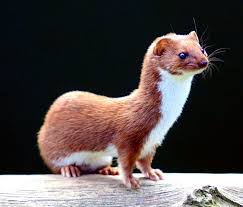
中文词源
weasel 黄鼠狼
来自Proto-Germanic*wisulon,臭气,臭味,来自PIE*weis,臭液,流出,词源同bison,virus。用于指黄鼠狼。
英语词源
- weasel (n.)
- Old English weosule, wesle "weasel," from Proto-Germanic *wisulon (cognates: Old Norse visla, Middle Dutch wesel, Dutch wezel, Old High German wisula, German Wiesel), probably related to Proto-Germanic *wisand- "bison" (see bison), with a base sense of "stinking animal," because both animals have a foul, musky smell (compare Latin vissio "stench"). A John Wesilheued ("John Weaselhead") turns up on the Lincolnshire Assize Rolls for 1384, but the name seems not to have endured, for some reason. Related: Weaselly.
- weasel (v.)
- "to deprive (a word or phrase) of its meaning," 1900, from weasel (n.); so used because the weasel sucks out the contents of eggs, leaving the shell intact. Both this and weasel-word are first attested in "The Stained-Glass Political Platform," a short story by Stewart Chaplin, first printed in "Century Magazine," June 1900:
"Why, weasel words are words that suck all the life out of the words next to them, just as a weasel sucks an egg and leaves the shell. If you heft the egg afterward it's as light as a feather, and not very filling when you're hungry; but a basketful of them would make quite a show, and would bamboozle the unwary."
They were picked up at once in American political slang. The sense of "extricate oneself (from a difficult place) like a weasel" is first recorded 1925; that of "to evade and equivocate" is from 1956. Related: Weasled; weasling.
权威例句
- 1. Fox, badger, weasel and stoat are regularly seen here.
- 狐狸、獾、黄鼠狼和白鼬在这里很常见。
- 2. A weasel ran off with a chick in its mouth.
- 黄鼠狼叼走一只小鸡.
- 3. The weasel is a very pretty little creature.
- 黄鼬是一种很可爱的小动物.
- 4. Weasel here could be my wife or my sister for all I know.
- 这位Weasel可能是我的妻子或姐妹,这可说不准.
- 5. He might be a bore, but he was as quick-witted as a weasel.
- 他也许是个很无聊的人,可是却像黄鼠狼一样机灵。